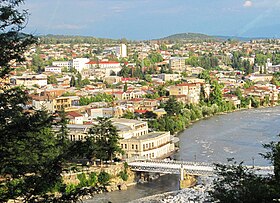
Back Қәҭешь Abkhazian Koetaisi Afrikaans كوتايسي Arabic كوتايسى ARZ Kutaisi AST Кутаиси AV Kutaisi Azerbaijani Кутаиси Bashkir Kotaisis BAT-SMG Кутаісі Byelorussian
Kutaisi
ქუთაისი | |
|---|---|
|
Top to bottom: Downtown Kutaisi & White Bridge as seen from Mount Gora, A downtown street, Bagrati Cathedral in 2014 | |
| Coordinates: 42°15′0″N 42°42′0″E / 42.25000°N 42.70000°E | |
| Country | |
| Region (Mkhare) | Imereti |
| Established | 13th century BC[a][b] |
| Government | |
| • Type | Mayor–Council |
| • Body | Kutaisi City Assembly |
| • Mayor | David Eremeishvili |
| Area | |
• Total | 67.7 km2 (26.1 sq mi) |
| Elevation | 80 m (260 ft) |
| Population (2024)[3] | |
• Total | 125,589 |
| • Density | 1,900/km2 (4,800/sq mi) |
| Population by ethnicity[4] | |
| • Georgians | 99.0 % |
| • Russians | 0.36 % |
| • Ukrainians | 0.10 % |
| • Armenians | 0.09 % |
| Time zone | UTC+4 (Georgian Time) |
| Postal code | 4600-4699 |
| Area code | (+995) 431 |
| Climate | Cfa |
| Website | kutaisi |
 | |
Kutaisi (/kuːˈtaɪsiː/ koo-TY-see,[5] Georgian: ქუთაისი pronounced [ˈkʰutʰaisi] ⓘ) is a city in the Imereti region of the Republic of Georgia. One of the oldest continuously inhabited cities in the world, it is the third-most populous city in Georgia after Tbilisi and Batumi. It lies 221 kilometres (137 miles) west of Tbilisi, on the Rioni River, and is the capital of Imereti.
Historically one of the major cities of Georgia, it served as the political center of Colchis in the Middle Ages as the capital of the Kingdom of Abkhazia[6] and Kingdom of Georgia and later as the capital of the Kingdom of Imereti. From October 2012 to December 2018, Kutaisi was the seat of the Parliament of Georgia as an effort to decentralize the Georgian government.
- ^ Toponymy as Documentary Material Confirming Historical and Cultural Kinship (Astionym “Kutaia/Kutaisi” and aspects of centuries-old relations between Greece and Georgia). IAI Academic Conference Proceedings, Venice, 27 March 2023. p.p. 23-26.
- ^ მიხეილ თამარაშვილი „ქართული ეკლესია დასაბამიდან დღემდე“. საქართველოს პარლამენტის ეროვნული ბიბლიოთეკა, წიგნადი ფონდი. გვერდი 86.
- ^ "Population by regions". National Statistics Office of Georgia. Retrieved 28 April 2024.
- ^ "Ethnic composition of Georgia 2014". mashke.org. Archived from the original on 4 November 2018.
- ^ ""Kutaisi", Dictionary.com". Archived from the original on 16 April 2018. Retrieved 15 April 2018.
- ^ Bondyrev, Igor V; Davitashvili, Zurab V; Singh, V. P (2015). The geography of Georgia: problems and perspectives. Springer. ISBN 978-3-319-05413-1. OCLC 912320815.
Cite error: There are <ref group=lower-alpha> tags or {{efn}} templates on this page, but the references will not show without a {{reflist|group=lower-alpha}} template or {{notelist}} template (see the help page).






